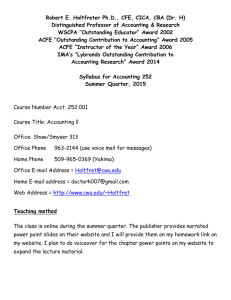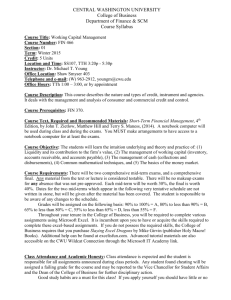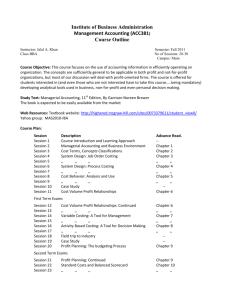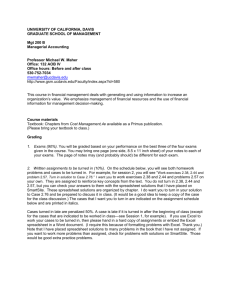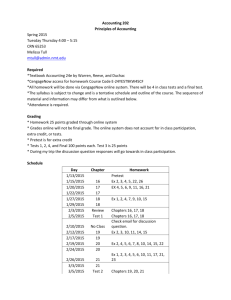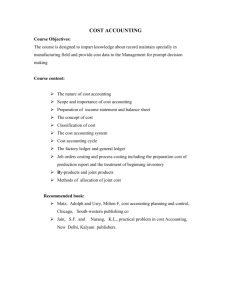Acct 305
advertisement
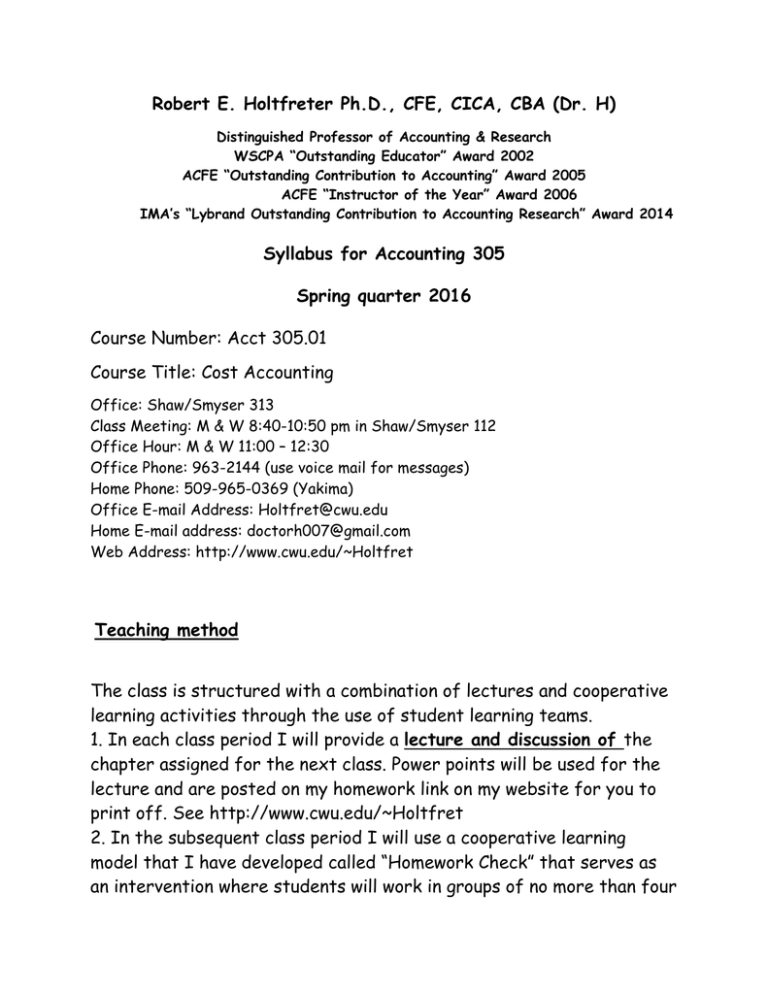
Robert E. Holtfreter Ph.D., CFE, CICA, CBA (Dr. H) Distinguished Professor of Accounting & Research WSCPA “Outstanding Educator” Award 2002 ACFE “Outstanding Contribution to Accounting” Award 2005 ACFE “Instructor of the Year” Award 2006 IMA’s “Lybrand Outstanding Contribution to Accounting Research” Award 2014 Syllabus for Accounting 305 Spring quarter 2016 Course Number: Acct 305.01 Course Title: Cost Accounting Office: Shaw/Smyser 313 Class Meeting: M & W 8:40-10:50 pm in Shaw/Smyser 112 Office Hour: M & W 11:00 – 12:30 Office Phone: 963-2144 (use voice mail for messages) Home Phone: 509-965-0369 (Yakima) Office E-mail Address: Holtfret@cwu.edu Home E-mail address: doctorh007@gmail.com Web Address: http://www.cwu.edu/~Holtfret Teaching method The class is structured with a combination of lectures and cooperative learning activities through the use of student learning teams. 1. In each class period I will provide a lecture and discussion of the chapter assigned for the next class. Power points will be used for the lecture and are posted on my homework link on my website for you to print off. See http://www.cwu.edu/~Holtfret 2. In the subsequent class period I will use a cooperative learning model that I have developed called “Homework Check” that serves as an intervention where students will work in groups of no more than four to go over all the answers to the assigned review questions and discussion issues after you have completed them outside of class. This provides a classroom environment learning process where you can learn by asking questions to your peers (that you would otherwise not ask your professor) and also explain the answers to questions those who need help. 3. Then I will provide a summary and discussion of the major concepts for all the assigned review questions and discussion issues to reinforce their importance. Description of Course (Adapted): Compare financial/managerial accounting; cost management concepts; cost behavior analysis; job order costing; activity based costing; joint/by-product costing; process costing; standard costing; costvolume-profit analysis; relevant costing; performance evaluation; profitability analysis. Student Learner Outcomes: By the end of the course, the student should be able to: Discuss the role of today’s cost/ management accountant and financial accountant differ Discuss the basic cost management concepts. Use the various quantitative methods for estimating cost behavior. Prepare the entries for a job order cost system. Discuss the procedures for developing an activity based cost system. Prepare a master budget. Discuss the methods for accounting for joint and by products Implement the procedures for developing the FIFO and Weighted Average process cost systems. Do a variance analysis and prepare the standard costing entries for direct labor and direct material. Do a variance analysis and prepare the standard costing entries for variable and fixed overhead. Use relevant costing concepts in a variety of business decisions. Text: Fundamentals of Cost Accounting by Lanen, Anderson & Maher 4th Ed. Student Responsibilities and Requirements: I expect students to attend class and take part in all the learning activities. There is a very high correlation between class attendance and grades. You are expected to have your homework completed when you come to class so you can work effectively in the student learning teams. You should read the chapter material assigned each day enough times so that you can do most of your homework without looking back at the examples in the chapter. You also are expected to be actively involved in the student learning teams and are highly encouraged to come to my office when you need help. Homework: Chapter assignments are posted on my web site for the entire quarter. It is important to check the homework link on my web site every week for any possible changes in assignments and other information. At the start of class each day, each student's homework will be evaluated for degree of completion. If most of the homework is completed an (+) will be recorded; if about one-half of the homework is completed a check mark will be recorded; if very little or none of the homework is completed a minus mark will be recorded. This is a system to identify students who are experiencing difficulty completing the homework. One advantage of this system is that you will be able to correct your errors for your answers in class and be able to retain the homework for immediate study. Upgrading of teaching to enhance student learning: It is common knowledge that college graduates will work on teams or in groups when employed in the workplace. To help develop the problem solving, decision making, interaction, leadership, strategic/critical thinking and communication skills necessary to work on teams and to enhance performance, student-learning teams will be used in class. Testing and grading policies: The test questions are based on all the concepts covered in your homework assignments. Your grade will be partly determined with the use of three regular required exams, which count 100 points each. You may take an exam early (i.e. before it is scheduled for the class) on any day the class meets but not after. There are no make-up exams. In addition, a comprehensive optional exam will offered for those students who want to take a chance to improve their average score and grade for the course and it counts 100 additional points. Your score on this exam will not replace any other test score i.e. no exam scores will be dropped. In summary, the total possible points in the course will be 300 or 400 (if you take the optional comprehensive test to improve your grade) plus any points for homework assignments and unannounced quizzes (10 points each). No points will be given for attendance; but you will earn 5 points for each chapter homework assignment if it is complete, checked in at the start of the class on the day it is due and you attend class for the entire time. Extra credit will not be given under any circumstances. To get credit for an answer on a test, all relevant calculations must be provided. In other words, if you circle the correct answer by guessing but do not provide the relevant calculations to support the answer, you will not get any credit or points. On the other hand, if you provide all the relevant calculations to support your derived answer and circle the wrong answer because of a math error, you will get full credit for the work. In other words, on test items that require calculations, I grade the work, not the answer. Cheating of any sort, including the use of crib sheets, etc., will not be allowed. The penalty for such behavior will be an "F" for the course. After the tests are scored, we will go over them in class. They will be then collected and kept in my office. A permanent score of zero will be recorded for any test or quiz that is not returned during the class session in which it was reviewed i.e. the optional final exam score cannot be used to replace the permanent test score of zero. I have the reputation of treating all students the same - in a very ethical, professional and non-fraudulent manner that is objective and fair. In the same way that your degree is earned, your grade for the course is earned – by you. Faculty don’t give out grades (this is a myth) – they are earned by the students. Therefore, I expect students to also behave in the same manner throughout the class and by not asking me to “bump up a grade” at the end of the course, unless I have made an error in calculating it. No exceptions!! Grade Determination: Grades are based on the following preset standards; i.e. a curve will not be used. A = 91-100 C- = 70- 72 A - = 90 D+ = 69 B+ = 88- 89 D = 66 - 68 B = 83- 87 D - = 65 B- = 80- 82 F C+ = 78- 79 C = 73- 77 = 0 - 64 Sequence of chapters covered on tests Chapter 1 Chapter 2 Chapter 5 Chapter 7 Exam # 1 – chapters 1, 2, 5, 7. Chapter 16 Chapter 8 Exam # 2 – chapters 16 & 8. Chapter 9 Chapter 11 Chapter 4 Test # 3 - chapters 9, 11 & 4. Optional comprehensive final test – all chapters. Other important information The homework assignments, the chapters assigned to tests, and the number of exams is subject to change. The professor reserves the right to correct a score on any test or the presentation and the grade for the course before or after the grades are turned in if errors are found. Wednesday, March 30 - the class officially starts. Monday, April 4 - change of schedule period ends. March 29 – April 4 - Uncontested withdrawal period. Monday, May 30 – Memorial Day holiday: no class. Wednesday, June 1 – last day of instruction for our class. Friday, June 3 – Hardship withdrawal deadline. Friday, June 3 - Complete university withdrawal deadline. June 6 – 9: Final exams week. The comprehensive optional final exam date will be announced once the university sets the date later in the course. Students who have special needs or disabilities that may affect their ability to access information or material presented in this course are encouraged to contact me or the office of Disability Support Services at (509) 963-2171 for additional disabilityrelated educational accommodations. University policies regarding academic dishonesty, sexual harassment, plagiarism, and diversity will be strictly observed in this course. See Appendices A and B in the CWU Undergraduate/Graduate Catalog. Department policies for taking tests: 1. Memory calculators, cell phones, palm pads, electronic dictionaries or any other electronic devices are not allowed to be used during the taking of an exam. Our department has a policy that only Texas Instruments "Math-Mate" or a similar calculator may be used. 2. The only items allowable on the table are the test, non-memory calculator, pencil/pen and paper supplied by the instructor. 3. No hats or caps can be worn. 4. University policies regarding academic dishonesty, sexual harassment, plagiarism, and diversity will be strictly observed in this course. See Appendices A and B in the 2005-2006 CWU Undergraduate/Graduate Catalog. Cheating of any sort, including the use of crib sheets, electronic devices or copying other students’ answers, etc. will not be tolerated. The penalty for such behavior will be an "F" for the course. EXHIBIT A Robert Holtfreter, Ph.D., CFE, CICA, CBA Course: Accounting 305 To: Dr. Holtfreter I have carefully read the course outline and completely understand all of its contents. I also give Professor Holtfreter the right to post test scores as part of a mass email using the last four numbers of the student’s ID number for security. Print name_________________________________ Sign name _________________________________ Date ___________________________________
